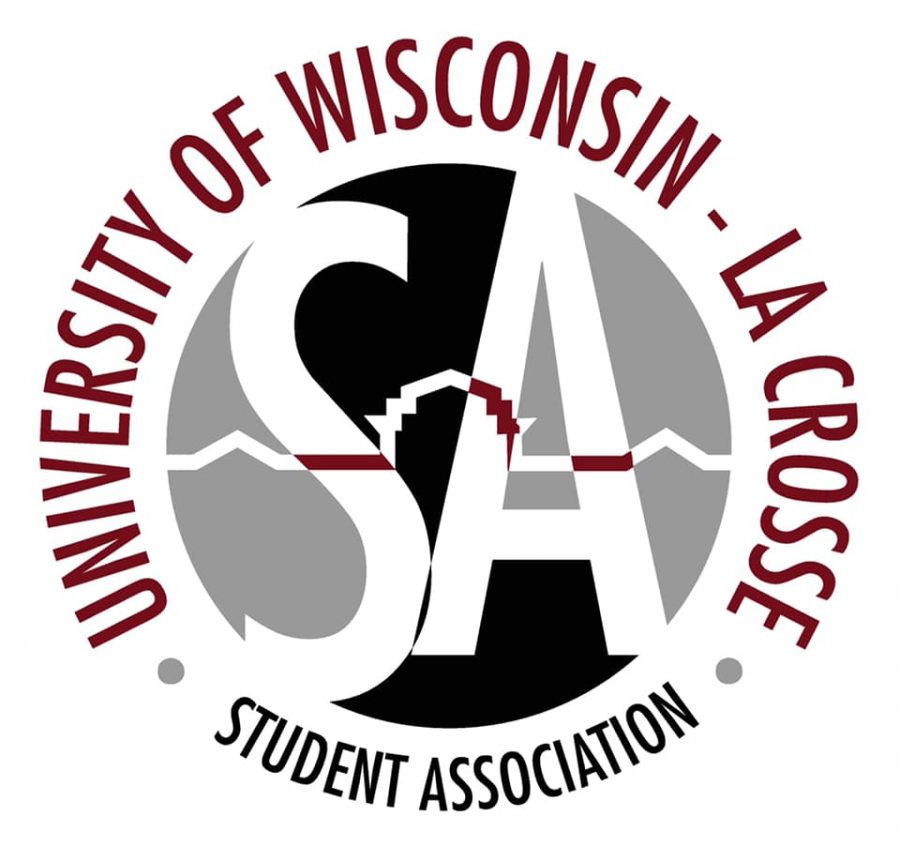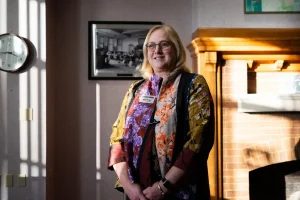Student Senate welcomes state senator Jennifer Shilling, discusses calls for open forum
October 24, 2019
The Student Association of the University of Wisconsin-La Crosse met on October 23, 2019 and welcomed the 32nd Senate District representative Jennifer Shilling as a guest speaker, introduced new resolutions, and new senators, including the year’s first graduate student representative.
Shilling, who described herself as “proud UWL alumna,” discussed her role with the La Crosse legislature and her plans on making the university a valuable contributor to the UW-System. Shilling served on the La Crosse County Board as a member for the College Democrats, was elected and defeated a man 58 years her senior and works to embody the rich tradition UWL has with student body representation in local government. Shilling acts as an active member of the alumni association, aiming to “pay it forward” for the next generation of hopeful politicians.
Shilling came from a family of college graduates and indicated how lucky she is to have avoided the spike in tuition and diminishment of financial aid resources that many universities struggle with now. Her representation in the state senate covers the southern part of Monroe county and represents 176,000 people. She works with higher education and local health committees in La Crosse, including UWL, Viterbo, and Western Technical College, as well as Mayo Clinic and Gunderson Health Systems, calling this involvement a “natural fit” for her due to the impact these institutions have on her community. She is currently the senate democratic leader; a position she defines as a sort of “class president” for the 14 democratic senators in the state senate.
“Having served two decades in the state senate, I want to continue to be a voice for this campus, as we have many exciting things happening for this campus,” Shilling said. As an alumna, she feels the area that gratifies her the most is the amount of tax payer money that has gone into the remodeling and construction at UWL, a trend she hoped would have continued through the second phase of construction to the Prairie Springs science building, which the Wisconsin Legislature’s Joint Committee denied on June 11. UWL was fortunate enough to be granted $14 million in renovations to Graff Main Hall and $24.5 million for a new Fieldhouse, coming from student fees.
Currently the republican-controlled La Crosse legislature is in the midst of their fall floor period, which splits the state legislature under the new Evers governance. This frustrates Shilling, as Democrats from the State Senate have had only seven meetings with the republican legislature this year. The usual protocol is for democrats and republicans to meet two or three times a week, but they met zero times in September. One meeting was held in October, with the same number of meetings to be held for November, and January. For Shilling, this attitude from the legislature demonstrates a “do nothing, adjourn nothing” ideology. Many things could be done, according to Shilling, such as broadband expansion, transportation, education, and health care, but “because we find ourselves in what I like to call an ‘arranged marriage’ by voters,” said Shilling, “we need to be working together, and right now I am seeing a breakdown in the system and it frustrates me.”
Shilling expressed her sympathy for her republican colleagues saying how she wishes to extend an “olive branch” to her counterparts, as she believes it important to be able to discuss these issues instead of avoiding them in the name of personal opinion. “I believe in servant leadership and in being problem solvers, we aren’t seeing that; the republican voters deserve better.”
Shilling also addressed the growing costs on campus which could help “back-fill” the current tuition freeze UWL has found itself in. Financial aid eligibility has been wide spread these past few years, and Shilling deems it important to have this resource as available to students as possible. She’s also been involved with a task force regarding student debt, which is in the process of finding ways to refinance student debt, but again, “when you only meet one day a month, there is just a lot of work jammed up,” Shilling said.
Once every ten years, redistricting happens after the census is taken, which is set to take place this year. In 2021, new maps will be drawn out which will help the senate legislature to identify the growth in the area, and Shilling plans to make sure that these maps appropriately reflect the change in population that La Crosse has seen over the past decade. Shilling held listening sessions with her constituents to answer any questions they may have, most of which had to with what these changes means. Shilling stated that La Crosse has had a rigged districting system “as far as voter’s voices,” and aims end the republican’s rule over primaries, which is due in part to a “one party control,” making it easy for republicans to focus their attention on primaries.
“We have to make sure that they are operating under a bipartisan or moderate fashion,” Shilling said. This all comes down to proper voter turn out and fair representation, which is something she wants the senators to be aware of when they advocate their constituents once the 2020 voting term begins. “Historically, UWL has had one of the highest voter turn outs in the county, and we are proud that students are taking the time to participate,” Shilling said.
Shilling also took the time to take questions from the association. Sen. Fiegel asked Shilling for any recommendations on understanding what constituents need, to which Shilling responded with emphasis on how important it is to consistently host listening sessions as a conduit. “As you are working within your schools and inn classes, it’s important to ask what people would like to see the senate working on; what is it that weighs on them as constituents,” Shilling said. Sen. Wolfe inquired on the challenges the Wisconsin State senate faces regarding voter fraud, Shilling responding saying how Voter ID is a challenge in this state for the elderly, people of color, and students. This may not be as big of an issue for students at UWL, as they are able to use student ID’s as identification. Recently, the State assembly passed a legislation to have more poll workers, where teenagers ages 16-18 from the area are allowed to volunteer. “There are challenges, but no one should take for granted their right to vote,” Shilling said.
State Affairs Director Becker asked if there were any instances where voter fraud appeared in Wisconsin. Shilling discussed how the republican party has had “the loudest noise” in voter fraud in the state. There has been evidence to suggest that two-time voters, often from ballots being filled out at home and in local polls, have happened, but only in a handful of cases.“The system has worked” Shilling said. “It’s caught voting law violators when it’s had to.”
Sen. Schock asked how secure it would be if Wisconsin adopted an electronic voting system, after using a paper system for many years. Shilling recounted a situation in which out of 9000 votes in 2016, she was ahead in the polls with 58 votes. Months later 3 more where discovered, making it 61, proving it to be accurate and constitutional system. “I think that demonstrated that it works, but hacking and foreign interference in Wisconsin is something we are becoming aware of,” Shilling said. She concluded her time with the student association by reminding them of her office hours on October 28 from 2:00-3:00 p.m. in room 3125 in the Student Union.
During officer reports, President Agterberg discussed a conversation she had with Chancellor Joe Gow on the student’s call for an open forum with the UWL administration, during which Gow said that he is “unable to do an open forum.” Gow’s regular open forum will be held November 14 at 3:30 p.m. in room 3310 in the Student Union.
Campus Climate coordinator AJ Clauss will hold an open forum for students to voice their concerns on October 29 from 11:30-1:15 p.m. UWL administrators have been invited, however, may not attend due to many being “out-of-town” as well as the short notice of the meeting. Title IX coordinator Nizam Arain will be in attendance.
The student senate discussed the adoption of an inclusion statement, which reads: “The University of Wisconsin La Crosse Student Association recognizes and values the diverse identities, backgrounds, and beliefs of out student body. Our definition of diversity includes, but is not limed to: age, class, nationality, race, religion, and sexual orientation. We are committed to providing and promoting an environment free of prejudice by addressing issues of equity and justice in our community, and we support the success of marginalized identities.”
The student association also welcomed new senators, including Abe Packard, a UWL graduate Student in the Biology Department.






